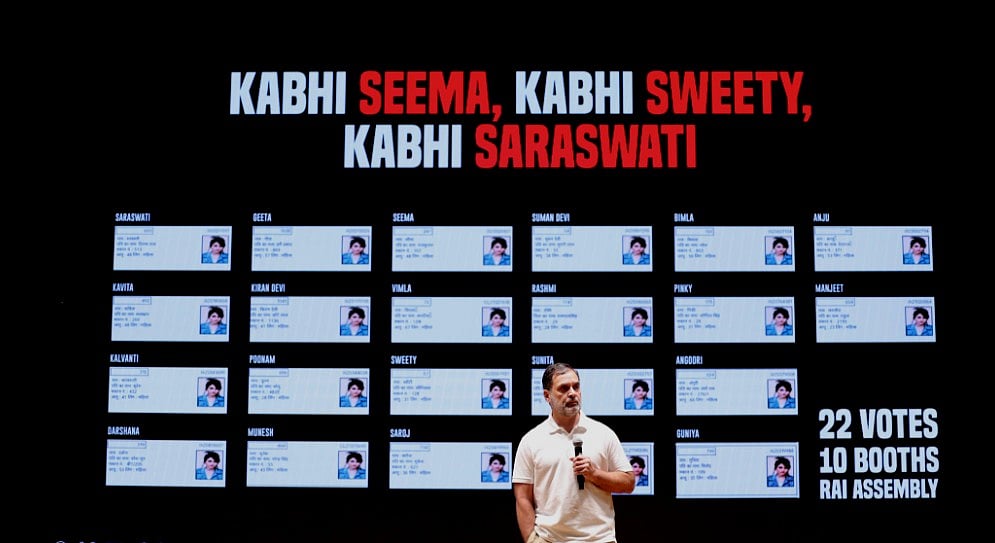
Rahul Gandhi's Election Fraud Allegations: What the EC Isn't Telling You
Why Election Commission cannot ignore the evidence of irregularities in Haryana voter rolls.

advertisement
On 5 November, India's Leader of Opposition Rahul Gandhi, in his third such press conference held in recent months, presented data to claim 'large-scale' rigging of the 2024 Assembly elections in Haryana.
In a series of detailed accusations, Rahul pointed to duplicate voter photos, cross‑state voter entries, and deleted names from the rolls as evidence of systematic manipulation aimed at tilting the results.
He said that his team has data to prove that at least 25 lakh votes were fake, manipulated, or fraudulently cast, a claim that could undermine the legitimacy of the election process.
This has triggered intense debate across media and social media platforms.
Several mainstream media outlets, while covering the allegations extensively, questioned the scale and substantiation of his accusations. They pointed out that some of the anomalies Rahul cited, such as duplicate voter photos or names listed under 'house number 0', are common administrative errors seen in previous elections and are not necessarily indicative of fraud.
In this piece, we make a case, using by EC's own data and facts, to raise a simple question: Why hasn’t the Election Commission acted decisively to investigate these allegations?
The Weight of Evidence
Rahul Gandhi’s allegations weren’t mere conjectures. They were based on concrete findings, including instances of duplicate photos, incorrectly listed voters, and deleted names that could alter the results.
Independent investigations have supported some of these claims. For instance, an investigation by India Today revealed that in one village mentioned by Rahul, Dhakola, the voter rolls contained suspicious duplications, but Congress’s vote share had actually increased there.
While the poll body has repeatedly maintained, even in the past, that there is no truth to Rahul's allegations, it also quietly introduced features such as e-sign authentication system for its ECINet portal app.
This was aimed to address controversies over voter list deletions. This technical upgrade requires anyone seeking registration, deletion, or correction of voter details to verify their identity using an Aadhaar-linked mobile number. Previously, individuals could submit requests by entering a voter photo identity card number and any mobile number, without verification of true ownership.
Similarly, the rollout of nationwide Special Intensive Revision (SIR) of voter rolls was presented as a means to 'purify' electoral rolls. Even during this process, however, EC has admitted to not using its de-duplication software raising concerns about the utility of the entire exercise.
Missing the Bigger Picture
So far, the mainstream media's coverage of the issue has missed several big picture points. For instance, in response to Rahul's claim of a woman named Charanjeet Kaur appearing 223 times in the voter rolls of two booths, The Indian Express published a story which stated that despite her name appearing 223 times, Kaur only voted once.
The point, however, is that neither Rahul nor the Congress party alleged that Charanjeet Kaur voted these many times. The real issue is that her name appearing multiple times, leaves space for rigging and creates possibility of someone else going to a booth and casting their vote.
If this actually happened or not can only be confirmed by probing the CCTV footage of the booth or by checking form 17a in which the polling officer notes down if a particular voter turned up to the booth on the day of election.
The persistence of discrepancies in voter rolls, the lack of transparency in roll revisions, and the failure of the Election Commission to address these irregularities in a timely manner are not just isolated incidents, they point to deeper flaws that could impact the fairness and credibility of the entire election process.
What EC's Silence Actually Means
The ECI’s dismissive attitude towards these claims, based on the fact that Congress did not file formal objections, seems to ignore the larger issue at hand: the credibility of the electoral process itself.
It is not enough for the Commission to merely point to a lack of formal complaints. The presence of large‑scale irregularities, which have been verified by independent sources, demands immediate action.
In its current form, the Election Commission’s response sets a dangerous precedent. Electoral transparency and fairness cannot rest solely on the assumption that everything is working fine unless proven otherwise.
What’s at Stake?
The core issue here is not whether Rahul Gandhi’s claims are entirely accurate but whether the Election Commission has done enough to investigate the potential flaws in the system.
If even a small fraction of voters feel their votes are being manipulated or erased, the results are in question. It, thus, is vital that the Election Commission not only reacts to public claims but also actively investigates potential issues that affect the broader democratic process.
Why has the ECI failed to independently investigate irregularities raised by a leader of opposition, backed by evidence from credible sources?
What measures is the Election Commission taking to ensure that the electoral roll is truly reflective of the electorate, without discrepancies such as duplicate entries, wrong names, and unfair deletions?
Why hasn’t there been a public, independent audit of the election process to verify the claims of fraudulent activity raised by the Congress party and others?
Without clear answers to these questions, the Election Commission's silence becomes an endorsement of a flawed process. As it stands, the public is left wondering: if these issues had been flagged by any other party, would the ECI have acted differently?
- Access to all paywalled content on site
- Ad-free experience across The Quint
- Early previews of our Special Projects
Published: undefined